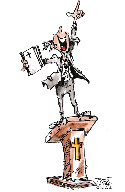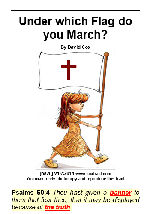Chapters on Jewish Literature
Jewish Literature
by Israel Abraham
(1899)
Israel Abrahams (1858-1925) was a leading British Jewish scholar. In 1902 Abrahams came to the United States to teach at the Jewish Theological Seminary of America. Chapters on Jewish Literature contains 25 short chapters on Jewish literature, opening with the fall of Jerusalem in 70 and ending with the death of Moses Mendelssohn in 1786.
CONTENTS of Chapters on Jewish Literature

Stalker The Preacher and His Models Looks at the Preacher as a Man of God, a Patriot, a man of the Word, as a False Prophet, as a man, as a Christian, as an Apostle, and as a Thinker.
Read the Work: Stalker The Preacher and His Models.
Preface
1 The “Vineyard” At Jamnia Schools at Jamnia, Lydda, Usha, and Sepphoris.—The Tannaim compile the Mishnah.—Jochanan, Akiba, Meir, Judah.—Aquila.
2 Flavius Josephus And The Jewish Sibyl
3 The Talmud — The Amoraim compile the Palestinian Talmud and the Babylonian Talmud.— Representative Amoraim:
I (220-280) Palestine—Jochanan, Simon, Joshua, Simlai; Babylonia—Rab and Samuel.
II (280-320) Palestine—Ami, Assi, Abbahu, Chiya; Babylonia—Huna and Zeira
III (320-380) Babylonia—Rabba, Abayi, Rava.
IV (380-430) Babylonia—Ashi (first compilation of the Babylonian Talmud).
V and VI (430-500) Babylonia—Rabina (completion of the Babylonian Talmud).
4 The Midrash And Its Poetry — Mechilta, Sifra, Sifre, Pesikta, Tanchuma, Midrash Rabbah, Yalkut.—Proverbs.—Parables.—Fables.
5 The Letters Of The Gaonim — Representative Gaonim: Achai, Amram, Zemach, Saadiah, Sherira, Samuel, Hai.
6 The Karaitic Literature — Anan, Nahavendi, Abul-Faraj, Salman, Sahal, al-Bazir, Hassan, Japhet, Kirkisani, Judah Hadassi, Isaac Troki.
7 The New-Hebrew Piyut — Kalirian and Spanish Piyutim (Poems).—Jannai.—Kalir.
8 Saadiah Of Fayum —Translation of the Bible into Arabic.—Foundation of a Jewish Philosophy of Religion.
9 Dawn Of The Spanish Era —Chasdai Ibn Shaprut.—Menachem and Dunash, Chayuj and Janach.—Samuel the Nagid.
10 The Spanish-Jewish Poets (I) Solomon Ibn Gebirol.—”The Royal Crown.”—Moses Ibn Ezra .—Abraham Ibn Ezra.—The Biblical Commentaries of Ibn Ezra and the Kimchis.
11 Rashi And Alfassi— Nathan of Rome.—Alfassi.—Rashi.—Rashbam.
12 The Spanish-Jewish Poets (II) Jehuda Halevi.—Charizi.
13 Moses Maimonides — Maimon, Rambam—R. Moses, the son of Maimon, Maimonides.—His Yad Hachazaka and Moreh Nebuchim.—Gersonides.—Crescas.—Albo.
14 The Diffusion Of Science Provençal Translators.—The Ibn Tibbons.— Italian Translators.—Jacob Anatoli.— Kalonymos.—Scientific Literature.
15 The Diffusion Of Folk-Tales — Barlaam and Joshaphat.—The Fables of Bidpai.— Abraham Ibn Chisdai.—Berachya ha-Nakdan.— Joseph Zabara.
16 Moses Nachmanides —French and Spanish Talmudists.—The Tossafists, Asher of Speyer, Tam, Isaac of Dompaire, Baruch of Ratisbon, Perez of Corbeil.— Nachmanides’ Commentary on the Pentateuch.— Public controversies between Jews and Christians.
17 The Zohar And Later Mysticism — Kabbala.—The Bahir.—Abulafia.—Moses of Leon.— The Zohar.—Isaac Lurya.—Isaiah Hurwitz.— Christian Kabbalists.—The Chassidim.
18 Italian Jewish Poetry — Immanuel and Dante.—The Machberoth.—Judah Romano.— Kalonymos.—The Eben Bochan.—Moses Rieti.—Messer Leon.
19 Ethical Literature — Bachya Ibn Pekuda.—Choboth ha-Lebaboth.—Sefer ha-Chassidim.— Rokeach.—Yedaiah Bedaressi’s Bechinath Olam.—Isaac Aboab’s Menorath ha-Maor.—Ibn Chabib’s “Eye of Jacob.”—Zevaoth, or Ethical Wills.— Joseph Ibn Caspi.—Solomon Alami.
20 Travellers’ Tales — Eldad the Danite.—Benjamin of Tudela.—Petachiah of Ratisbon.— Esthori Parchi.—Abraham Farissol.—David Reubeni and Molcho.— Antonio de Montesinos and Manasseh ben Israel.—Tobiah Cohen.— Wessely.
21 Historians And Chroniclers — Order of the Tannaim and Amoraim.—Achimaaz.—Abraham Ibn Daud.— Josippon.—Historical Elegies, or Selichoth.—Memorial Books.— Abraham Zacuto.—Elijah Kapsali.—Usque.—Ibn Verga.—Joseph Cohen.— David Gans.—Gedaliah Ibn Yachya.—Azariah di Rossi.
22 Isaac Abarbanel — Abarbanel’s Philosophy and Biblical Commentaries.—Elias Levita.— Zeëna u-Reëna.—Moses Alshech.—The Biur.
23 The Shulchan Aruch — Asheri’s Arba Turim.—Chiddushim and Teshuboth.—Solomon ben Adereth.— Meir of Rothenburg.—Sheshet and Duran.—Moses and Judah Minz.— Jacob Weil, Israel Isserlein, Maharil.—David Abi Zimra.—Joseph Karo.— Jair Bacharach.—Chacham Zevi.—Jacob Emden.—Ezekiel Landau.
24 Amsterdam In The Seventeenth Century — Manasseh ben Israel.—Baruch Spinoza.—The Drama in Hebrew.— Moses Zacut, Joseph Felix Penso, Moses Chayim Luzzatto.
25 Moses Mendelssohn — Mendelssohn’s German Translation of the Bible.—Phædo.— Jerusalem.—Lessing’s Nathan the Wise.
Preface1 The “Vineyard” At Jamnia Schools at Jamnia, Lydda, Usha, and Sepphoris.—The Tannaim compile the Mishnah.—Jochanan, Akiba, Meir, Judah.—Aquila.2 Flavius Josephus And The Jewish Sibyl3 The TalmudThe Amoraim compile the Palestinian Talmud and the Babylonian Talmud.— Representative Amoraim: I (220-280) Palestine—Jochanan, Simon, Joshua, Simlai; Babylonia—Rab and Samuel. II (280-320) Palestine—Ami, Assi, Abbahu, Chiya; Babylonia—Huna and Zeira III (320-380) Babylonia—Rabba, Abayi, Rava. IV (380-430) Babylonia—Ashi (first compilation of the Babylonian Talmud). V and VI (430-500) Babylonia—Rabina (completion of the Babylonian Talmud).4 The Midrash And Its Poetry Mechilta, Sifra, Sifre, Pesikta, Tanchuma, Midrash Rabbah, Yalkut.—Proverbs.—Parables.—Fables.5 The Letters Of The Gaonim Representative Gaonim: Achai, Amram, Zemach, Saadiah, Sherira, Samuel, Hai. 6 The Karaitic Literature Anan, Nahavendi, Abul-Faraj, Salman, Sahal, al-Bazir, Hassan, Japhet, Kirkisani, Judah Hadassi, Isaac Troki.7 The New-Hebrew Piyut Kalirian and Spanish Piyutim (Poems).—Jannai.—Kalir. 8 Saadiah Of Fayum Translation of the Bible into Arabic.—Foundation of a Jewish Philosophy of Religion. 9 Dawn Of The Spanish Era Chasdai Ibn Shaprut.—Menachem and Dunash, Chayuj and Janach.—Samuel the Nagid. 10 The Spanish-Jewish Poets (I) Solomon Ibn Gebirol.—”The Royal Crown.”—Moses Ibn Ezra .—Abraham Ibn Ezra.—The Biblical Commentaries of Ibn Ezra and the Kimchis.11 Rashi And Alfassi Nathan of Rome.—Alfassi.—Rashi.—Rashbam. 12 The Spanish-Jewish Poets (II) Jehuda Halevi.—Charizi. 13 Moses Maimonides Maimon, Rambam—R. Moses, the son of Maimon, Maimonides.—His Yad Hachazaka and Moreh Nebuchim.—Gersonides.—Crescas.—Albo.14 The Diffusion Of Science Provençal Translators.—The Ibn Tibbons.— Italian Translators.—Jacob Anatoli.— Kalonymos.—Scientific Literature. 15 The Diffusion Of Folk-Tales Barlaam and Joshaphat.—The Fables of Bidpai.— Abraham Ibn Chisdai.—Berachya ha-Nakdan.— Joseph Zabara. 16 Moses Nachmanides French and Spanish Talmudists.—The Tossafists, Asher of Speyer, Tam, Isaac of Dompaire, Baruch of Ratisbon, Perez of Corbeil.— Nachmanides’ Commentary on the Pentateuch.— Public controversies between Jews and Christians. 17 The Zohar And Later Mysticism Kabbala.—The Bahir.—Abulafia.—Moses of Leon.— The Zohar.—Isaac Lurya.—Isaiah Hurwitz.— Christian Kabbalists.—The Chassidim. 18 Italian Jewish Poetry Immanuel and Dante.—The Machberoth.—Judah Romano.— Kalonymos.—The Eben Bochan.—Moses Rieti.—Messer Leon. 19 Ethical Literature Bachya Ibn Pekuda.—Choboth ha-Lebaboth.—Sefer ha-Chassidim.— Rokeach.—Yedaiah Bedaressi’s Bechinath Olam.—Isaac Aboab’s Menorath ha-Maor.—Ibn Chabib’s “Eye of Jacob.”—Zevaoth, or Ethical Wills.— Joseph Ibn Caspi.—Solomon Alami. 20 Travellers’ Tales Eldad the Danite.—Benjamin of Tudela.—Petachiah of Ratisbon.— Esthori Parchi.—Abraham Farissol.—David Reubeni and Molcho.— Antonio de Montesinos and Manasseh ben Israel.—Tobiah Cohen.— Wessely. 21 Historians And Chroniclers Order of the Tannaim and Amoraim.—Achimaaz.—Abraham Ibn Daud.— Josippon.—Historical Elegies, or Selichoth.—Memorial Books.— Abraham Zacuto.—Elijah Kapsali.—Usque.—Ibn Verga.—Joseph Cohen.— David Gans.—Gedaliah Ibn Yachya.—Azariah di Rossi. 22 Isaac Abarbanel Abarbanel’s Philosophy and Biblical Commentaries.—Elias Levita.— Zeëna u-Reëna.—Moses Alshech.—The Biur. 23 The Shulchan Aruch Asheri’s Arba Turim.—Chiddushim and Teshuboth.—Solomon ben Adereth.— Meir of Rothenburg.—Sheshet and Duran.—Moses and Judah Minz.— Jacob Weil, Israel Isserlein, Maharil.—David Abi Zimra.—Joseph Karo.— Jair Bacharach.—Chacham Zevi.—Jacob Emden.—Ezekiel Landau. 24 Amsterdam In The Seventeenth Century Manasseh ben Israel.—Baruch Spinoza.—The Drama in Hebrew.— Moses Zacut, Joseph Felix Penso, Moses Chayim Luzzatto. 25 Moses Mendelssohn Mendelssohn’s German Translation of the Bible.—Phædo.— Jerusalem.—Lessing’s Nathan the Wise.
Download
Abelson - Jewish Mmysticism (140 downloads ) Abelson, J. - Jewish Mysticism (0 downloads )More on Jewish History

bs28 Do you live the Truth or Lies? is a tract about the Christian's relationship with truth and lies. We should seek to tell and live the Truth, and not falsehoods.
Topics: Under which Flag do you March? | Christians practice the Truth | The "truth" is Moral Principle | The "truth" is Moral Principle | To be the son of ... is to imitate such a person | A hypocrite is to say that you are something, but you live differently | Embracing Life is the only way.
Read the Tract: bs28 Do you live the Truth or Lies?.
MySwordmodules is a website dedicate to the MySword Bible Program for Androird devices. We host MySword Modules.
Donate a Cup of Coffee to Me

It takes a lot of work, energy, time, and money to create, maintain, protect, and make new works constantly. While you may benefit from all my work only spending 5 minutes a week, it takes me hours and hours, and hackers attacking, many more. Just $5 dollars goes a long way to cover my financial burden of managing this site.
Click to donate any amount.
